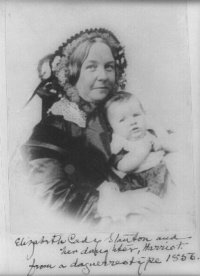
Elizabeth Cady Stanton and her daughter Harriot.
Elizabeth Cady Stanton (November 12, 1815 – October 26, 1902) was a social activist and a leading figure of the early women's rights movement in the United States.
Stanton wrote many of the more important documents and speeches of the women's rights movement and was, with her friend Lucretia Mott, the primary organizer of the 1848 Women's Rights Convention in Seneca Falls, New York. For this convention, Stanton drafted a Declaration of Sentiments, declaring that men and women are created equal. She also proposed a resolution, that was voted upon and carried, demanding voting rights for women. In 1851, Stanton met Susan B. Anthony, with whom she was to remain a close friend and colleague the rest of her life. Together, they founded in 1869 the National Woman's Suffrage Association, an organization dedicated to gaining women the right to vote. Stanton was its first president, serving until 1892. They also began the women's rights newsletter The Revolution, which included frequent contributions from Stanton. Starting in 1881, Stanton, Anthony and Matilda Joslyn Gage published the first of three volumes of the History of Woman Suffrage, an anthology of writings about the movement in which they were so prominent. This anthology reached six volumes by various writers in 1922. Stanton was also active internationally, and in 1888 helped prepare for the founding of the International Council of Women .
-
"The prejudice against color, of which we hear so much, is no stronger than that against sex. It is produced by the same cause, and manifested very much in the same way."
- -- Elizabeth Cady Stanton.
With her husband, Henry Stanton and cousin, Gerrit Smith, Elizabeth Cady Stanton was also active in the anti-slavery Abolitionist movement. Stanton had a strong friendship with abolitionist and former slave Frederick Douglass. In a view different from many modern activists, Stanton expressed a negative opinion on abortion. She addressed the issue in an 1873 letter to Julia Ward Howe, recorded in Howe's diary at Harvard University Library, and in editions of the newsletter The Revolution. Stanton suggested that solutions to abortion would be found, at least in part, in the elevation and enfranchisement of women. She was also a strong critic of religion in general and Christianity in particular. Stanton was also an outspoken supporter of the 19th century temperance movement.
Elizabeth Cady Stanton was born in Johnstown, New York to Daniel Cady and Margaret Livingston Cady. Daniel Cady was a prominent attorney who served a term in Congress and later became a judge. Margaret Livingston was the daughter of Colonel James Livingston, an officer in the Revolutionary War. Elizabeth Cady Stanton met Henry Brewster Stanton through her early involvement in the temperance and abolition movements. Henry Stanton was a journalist, an antislavery orator, and, after their marriage, became an attorney. The couple were married in 1840 and had seven children. Stanton died in 1902 and was interred in the Woodlawn Cemetery in The Bronx, New York.
USS Elizabeth C. Stanton (AP-69), a World War II troop transport, was named for her.
Writings
Related Writings
- Banner, Lois W. "Elizabeth Cady Stanton: A Radical for Women's Rights." Addison-Wesley Publishers, 1997. ISBN 0673393194.
- Dubois, Ellen Carol, editor. "The Elizabeth Cady Stanton-Susan B. Anthony Reader: Correspondence, Writings, Speeches." Northeastern University Press, September 1994. ISBN 1555531490.
- Gaylor, Annie Laurie. "Women Without Superstition : No Gods - No Masters" Publisher: FFRF; 1st edition, January 1, 1997. ISBN 1877733091.
- Griffith, Elisabeth. "In Her Own Right: The Life of Elizabeth Cady Stanton." Oxford University Press, Great Britain, 1985. ISBN 0195037294. Also by Galaxy Books, ISBN 0195034406.
- Sigerman, Harriet. "Elizabeth Cady Stanton: The Right Is Ours." Oxford University Press, November 2001. ISBN 019511969X.
- Ward, Geoffrey C., Burns, Ken, Burns, Ken C. "Not for Ourselves Alone: The Story of Elizabeth Cady Stanton and Susan B. Anthony." Knopf Publishing Group, December 2001. ISBN 037570969X.
Video
-
Ken Burns, director. Not for Ourselves Alone - The Story of Elizabeth Cady Stanton & Susan B. Anthony. DVD (1999).
References and external links